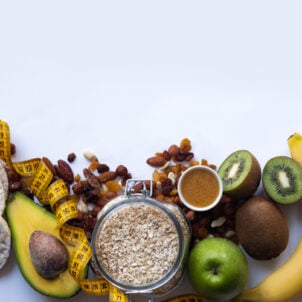If you’re someone who likes to be in the know about anything related to your health, you’ve probably read quite a bit about the importance of a healthy gut, which is an overall term used to describe the entirety of your gastrointestinal tract. Despite its single location in your body, it has an impact on pretty much every other system, including digestion, nutrient absorption, mood, brain health and even your immune system. If you are seeking a healthier gut and more balanced hormones, we’ve got you! Plus, the best gut health supplements to take.
There’s also an intricate collaboration between your gut and hormonal regulation. “It is kind of like a well-organized team, with the microbiome that is residing in your gut as the main director with the primary job of digestion and the microbiome taking on the crucial task of influencing hormones,” says functional nutritional therapy practitioner Tansy Rodgers, FNTP.

Cortisol, estrogen and the gut
For starters, the gut helps manage cortisol levels, which deal with stress, aids in creating serotonin for mood balance, and improves insulin sensitivity for better control of blood sugar, she explains. “The gut also collaborates with thyroid function, a key player in your body’s energy regulation, and participates in the processing of estrogen, essential for hormonal balance.”
Women, in particular, have estrogen, which plays a role in everything from reproductive and bone health to menstrual cycles, sleep and even mental health. Imbalances in estrogen levels can lead to a host of issues, including heavy, crampy periods, mood swings, increased risk of fractures, poor sleep, and even risk of certain cancers, warns Anna Bohnengel, MS, RD, LD a nutritionist who specializes in fertility care.
“Bacteria that reside in the gut help with the breakdown and excretion of excess estrogen,” she says. “What’s referred to as the ‘estrobolome’ helps metabolize estrogen, ensuring its proper elimination from the body—and disruptions in gut health can hinder this process, leading to estrogen excess.”
Consider amping up for your supplement routine with these best gut health supplements from us, HUM Nutrition.
“The stress hormone”
Another key hormone that can be directly influenced by the gut is “the stress hormone” cortisol. While cortisol plays an important role in enhancing your performance and stimulating immune response, Bohnengel warns that excessive amounts of cortisol can actually wreak havoc throughout your body. “Interestingly, the gut microbiome also influences cortisol metabolism, impacting how efficiently your body clears this hormone,” she says. “An imbalance in gut bacteria can exacerbate cortisol dysregulation, contributing to symptoms like weight gain, fatigue, poor sleep and anxiety.”
It’s safe to say that keeping your gut healthy will help you in more ways than just avoiding tummy troubles. Here are some key signs to look out for that may indicate that your gut—and your hormones—may be out of balance. Plus, the best gut health supplements to take along the way!
You’re bloated
If you feel bloated here and there, that’s not uncommon; however, if it starts to become a chronic issue, it could signal a more problematic issue related to your gut. “As the food travels through the digestive tract, it is meant to be fully broken down into its component parts by the time it reaches the intestines, but sometimes food particles aren’t completely broken down, which results in fermentation in the gut producing gas and bloating,” explains Canada-based naturopathic doctor and birth doula Sarah Connors, N.D. “Since hormones are mostly built in the body from other molecules, many of which come from the diet, hormone synthesis could become compromised if nutrients aren’t being absorbed properly.” Addressing the underlying cause of the bloating, she notes, could help improve the health of the gut and, by extension, hormone health.
The best gut health supplement for bloat, by far, is HUM’s Flatter Me!
You’re constipated
Constipation is another gut-related issue that happens now and then. But, like bloating, if it’s chronic there’s almost always a root cause such as not eating enough dietary fiber or drinking enough water. If left unchecked, constipation can negatively impact your detoxification pathways, warns Jenna Volpe, RDN, LD, CLT, gut health dietitian nutritionist, which may eventually also lead to inflammation and hormonal imbalance if left unchecked. “Drinking plenty of water is a helpful way to keep things moving as well as eating fiber-rich foods like fresh fruits, veggies, whole grains, and functional foods like ground flax seeds and chia seeds,” she says. “Eating at least 3 to 5 servings of veggies per day, opting for whole vs. refined grains, and incorporating a few tablespoons of ground flax and/or chia seeds into oatmeal or a smoothie can go a long way to optimize bowel movements.”
(Need a little poop boost? Try HUM’s Celery Juice Fiber Gummies!)
You’re experiencing loose stools or diarrhea
Loose stools can be related to certain medications or viruses, but they’re more often than not the result of poor digestion and/or nutritional malabsorption that’s the result of gut microbial imbalance, overgrowth of harmful pathogens, nervous system dysregulation, digestive insufficiency, and/or some kind of inflammation in the gut lining, warns Volpe. “When it comes to diarrhea, the first step should be pinpointing the root causes of why it’s happening—not just on the surface level of symptom management, but also in terms of clinical diagnosis and even on a functional level,” she says. “Once the root cause(s) of diarrhea have been pinpointed, it becomes easier to figure out which foods are triggering symptoms and how to bring things back into balance.”
You have certain food intolerances
It’s common for certain food intolerances or sensitivity to lead to gastrointestinal symptoms such as gas, bloating, cramping and/or diarrhea. While these food intolerances may seem like the norm these days, they’re often a sign that something is off balance in the gut whether it be in the gut lining, gut microbiome, nervous system, other digestive organs (liver, gallbladder, pancreas), or even in the immune system within the gut-associated lymphoid tissue (GALT), explains Volpe.
“Leaving food intolerances and food sensitivities unchecked can impair nutritional status and detoxification, which negatively impacts all systems of the body on some level,” she says. She recommends consulting qualified healthcare providers to determine not just which foods are triggering symptoms but also to figure out what’s causing the adverse food reactions on a root-cause level. “This is usually done through a combination of food-symptom journaling, clinical testing, and functional nutrition lab testing,” she adds.

You’re super moody
There’s a reason why the gut is often referred to as the “second brain” and it’s because it contains a complex network of neurons known as the enteric nervous system (ENS), which operates independently of the central nervous system (CNS) yet it still communicates with the vagus nerve that plays a vital role in regulating many essential bodily functions. Did you know that an estimated 95 percent of the feel-good hormone serotonin is produced in your gut? As such, disruptions in gut health can impact brain function and mood, explains Bohnengel. “If you notice frequent mood swings, anxiety, or irritability, it may be a sign that your gut-brain axis is out of balance,” she says.
Add HUM’s Hormone Balance into your daily routine. It’s a great add-to-your-lineup best gut health supplement.
You’re experiencing weight changes
Unexpected weight fluctuations might be tied to gut issues impacting metabolism, explains Rodgers. For proper hormone health, she recommends eating a balanced diet, getting regular exercise, detoxing toxins from the body, practicing mindfulness activities to decrease stress, and working on any emotional health obstacles that may be causing you stress.
You’re persistently tired
Feeling constantly tired despite adequate rest could be a sign that your gut health is compromised, warns Bohnengel. “If key nutrients, say vitamin B12 and iron, are not sufficiently absorbed from the GI tract, your cells may not be getting the oxygen and key building blocks needed to make energy,” she says. “A healthy microbiome also essential nutrients and energy molecules for the body. Imbalances in gut bacteria or poor nutrient absorption can lead to feelings of fatigue and low energy levels.”
The Takeaway…
When in doubt, consult a medical professional. But, remember, a balanced diet, strong supplement routine, plenty of sleep and stress mitigation are always ways in which you can help your gut get healthier and happier.








